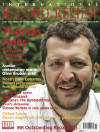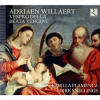Texte paru dans: / Appeared in:
*

International Record Review - (11/2012)
Pour
s'abonner / Subscription information
Ricercar
RIC325

5400439003255 (ID238)
Consultez toutes les évaluations recensées pour ce cd
~~~~ Reach all the evaluations located for this CD
It is perhaps apt that a composer perhaps best known nowadays as a distant predecessor of Monteverdi at St Mark’s in Venice should appear here in connection with such a Monteverdian title — I can surely not have been the only listener to this release to have trouble erasing expectations of Monteverdi’s fanfares after the Deus in adiutorium meum intende intonation. Willaert’s conception, though, is considerably more austere: only unaccompanied voices (here interspersed with brief organ solos), and largely without the madrigalian and operatic influences that have given Monteverdi’s Vespers music such an unassailable place in the repertoire. In Monteverdi’s case the question as to whether his Vespers music should be considered a single ‘work’ or a collection from which to select according to necessity and convenience has occupied much thought in recent years. In Willaert’s case there is no such question: the music here has been assembled from a variety of sources and the settings are not even all his own work, three of them having been composed in collaboration with Jacquet of Mantua, who composed the primus chorus to his secundus.
These are bracingly spare sonorities and finely chiselled. Closely matched solo voices make for well-balanced counterpoint and final chords of reedy, ringing purity — the modest fauxbourdon setting of ‘Domine ad adiuvandum me festina’ (Deus in adiutorium meum intende) allows Capilla Flamenca to show its ensemble sonority at its splendid best right from the beginning. The voices number a mere eight: two countertenors (one of whom commands a strikingly tenorial timbre, enabling a particularly smooth blend with his colleagues below), four tenors, a baritone and a bass (director Dirk Snellings himself). Their approach is flexible and organic, and they clearly enjoy a good mouthful of consonants at the traditional moments (such as ‘conquassabit capita in terra multorum’ from 3’54” in Dixit Dominus) without endangering the purity of the lines. It is nowadays thought unlikely that the antiphonal choirs characteristic of Venetian writing were in fact spatially separated in the building — there is a modest separation here, particularly when listening on headphones, but the tennis- match effect has been kept to a minimum.
The organ solos were recorded in an
entirely different corner of Europe from the vocal works (the Basilica di
San Petronio in Bologna, as opposed to the Kapel Zusters van Sint Vincentius
in Gijzegem). There is perhaps a slight acoustical difference but it is not
overly disturbing I doubt that I would have spotted it by listening alone.
This is a relatively sober collection of works but a perfectly coherent one
and beautifully executed. Perhaps there are no particular stand-out moments
here — there will surely be no hit single. Nonetheless, a magnificent hour
and a third of listening, rewarding careful
contemplation.
Fermer la fenêtre/Close window
Cliquez l'un ou l'autre
bouton pour découvrir bien d'autres critiques de CD
Click either button for many other reviews


